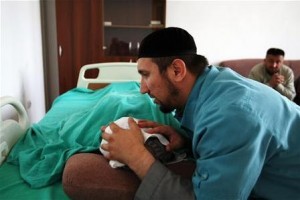Islamic Healers Treat Wounds in Russia’s Chechnya
By Thomas Grove
GROZNY, Russia | Thu Jul 21, 2011 12:27pm EDT
(Reuters) – Lying on a couch with her eyes closed, 26-year-old Milena sips water blessed by an Islamic healer who sits nearby reciting verses from the Koran to cure her depression.
Outside, a long line of patients wait at Chechnya’s state-run Islamic Medical Center, hoping its staff can heal deep psychological wounds left by years of war in the volatile region in Russia’s North Caucasus.
Nearly fifteen years after her brother was killed in the first separatist war, and more than a decade after the second conflict drove her family from their home, Milena is one of thousands of Chechens who have turned to traditional “Islamic” medicine for relief.
The center in the mountainous territory has flourished alongside a resurgence of Islam encouraged by firebrand leader Ramzan Kadyrov after years of repression by secular Communist authorities.
In a three-storey building in the Chechen capital Grozny, 11 healers prescribe treatments for anyone knocking on the door.
“We take in about 150 people a day, and we work around the clock,” said Daud Selmurzayev, the head of the center.
He said about 150,000 people had passed through the center’s doors since its opened two years ago to receive the treatments, popular among some branches of Islam but frowned upon by others.
Healing recitations of the Koran typically take about 30 minutes, he said.
“People understand that the Koran represents the mercy of Allah and in it is the savior from many illnesses,” he said.
Most patients are treated for depression or demonic possession, a commonly accepted affliction in Chechnya.
Demand is so high the center is planning to open a new hospital in the region at the end of the Muslim holy month of Ramadan, due to start in Russia on August 1.
The center is the latest in a series of religious initiatives from Kadyrov that have flown in the face of Russia’s secular constitution, and outraged rights workers and many Chechens.
Alcohol is all but banned, eateries were closed last year during the entire month of Ramadan and women must wear headscarves in state buildings — an edict passed by Kadyrov in 2007 that is in direct violation of the constitution.
The government runs an evening television program promoting the Islamic Medical Center and its healing powers.
OLD WOUNDS, FRESH TORMENTS
Nearly everyone in the region of almost 1.3 million has suffered through the violence and after effects of two separatist wars since the fall of the Soviet Union.
Milena, whose family fled Grozny during Russian bombardment, moved back to the rubble of the home she was born in. She helped rebuild the house and moved in with her parents and sister.
Her brother went missing as the family escaped and is assumed dead.
“The events of those years have left their mark. Depression was the reason I went to the Islamic Center,” said Milena, who declined to give her surname.
As wounds from the wars linger, fresh torments have arisen.
The Kremlin relies on Kadyrov to maintain a shaky peace in Chechnya and keep rebels in check. A growing insurgency across the North Caucasus wants to carve out a separate Islamic state.
Rights workers say Moscow turns a blind eye to numerous human rights abuses carried out by Kadyrov and his law enforcement officials as they fight the insurgency.
Kadyrov has repeatedly denied the accusations of kidnapping, torture and other abuses.
EVIL SPIRITS
Psychologists and medical doctors practice in Chechnya but say their patients are held back by a culture of pride. Fear of punishment from authorities has also silenced complaints and prevented people from coming forward with their problems, say medical staff. Patients at the Islamic Medical Center receive treatment without having to talk directly about their issues.
“The number of people in our republic who suffer from increasing psychological disorders is related to the last two wars,” said mullah Alikhan.
Like many Chechens, he also attributes the symptoms to evil spirits who he says are haunting the region.
“Evil spirits usually live in hard to access places, now they are moving to cities and villages … We have to look over our youth especially. Evil spirits as a rule target the youth just as they do the healthy,” said Alikhan, who declined to give his last name.
Many of the patients at the Islamic Medical Center are young with few direct memories of the conflict.
Raisa Zhdamaldayeva, 34, says her 10-year-old son refused to pray until she took him to the center, where he underwent treatment.
“I’m so glad Kadyrov built the center,” she said. “Now he doesn’t miss a single prayer.”


















